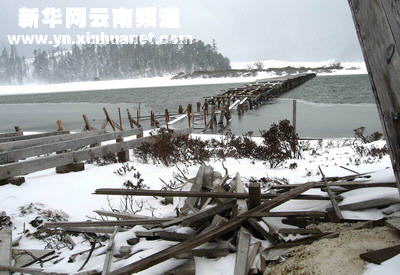Filming of movies and television programmes will not be
allowed at scenic spots in China without prior approval, the Ministry of
Construction said on Friday.
|

The picture shows a
dilapidated wooden bridge that crosses the Bigu lake in Shangrila after
the shooting of "The Promise", in Southwest China's Yunnan Province. Early
this week, Vice-Minister of Construction Qiu Baoxing criticized the crew
that filmed "The Promise" for damaging the pristine environment at Bigu
Tianchi in Shangrila County [Xinhua]
|
The restriction also applies to live commercial performances.
The ministry asked local construction authorities at the provincial level to
investigate a series of incidents in which movie companies reportedly caused
damage in scenic spots while filming.
Those responsible for any damage may receive fines and legal punishment. They
will also have to restore the damaged environment to its original state.
The ministry asked governments at all levels to take concrete measures to
protect scenic sites of cultural and historical value.
When movies or television programmes are to be filmed in such areas,
producers must seek environmental impact assessments from construction
departments at the provincial level, and final approval must be given from the
ministry.
Early this week, Vice-Minister of Construction Qiu Baoxing criticized the
crew that filmed "The Promise" for damaging the pristine environment at Bigu
Tianchi in Shangrila County, Southwest China's Yunnan Province.
A reinforced concrete structure was left on the lake's shore, and more than
100 wooden posts were left in the water, Qiu said.
The Beijing News reported on Friday that the crew of "The Promise" also
damaged about 60 trees in the Yuanmingyuan Garden (Old Summer Palace) during the
shooting of an autumn scene.
They painted the trees yellow all of them over 10 metres high at the end of
2004, and many have since withered.
But management staff of the garden said they knew nothing about how the
damage was caused, and the producer of the film could not be contacted,
according to the newspaper.
Li Aiming, an official of the Diqing Tibet Autonomous Prefecture, where Bigu
Tianchi is located, told China Daily on Friday that all the structures and
materials left by the crew had been dismantled and cleared.
"Environmental experts have reached the site to assess the impact," Li said.
The ministry told the Yunnan provincial bureau of construction to dispatch
investigators to deal with the issue, ministry official Wang Fengwu said on
Thursday.
The filmmakers behind "The Promise" said that they were not to blame for any
environmental damage because they paid the local government to clean up after
the shoot.
Jiang Xiaoyu, a China Central Television movie channel commentator, told
China Daily: "Whatever can be said in defence of the filmmakers, I think they do
bear the responsibility for the mess they left behind.
"Even though they said they had spoken to local authorities about the matter,
it remains to be explained what on earth they spoke about in the first place.
They should at least see to it that the site is indeed cleaned up."
Artists and critics in Beijing also said that authorities should legislate on
the filming at scenic spots.
Environmental activists welcomed the publicity of the event and its
significance, according to Wang Ping, a member of the Chinese People's Political
Consultative Conference (CPPCC), the national political advisory body.
"The environmental impact of cultural and entertainment industries has long
been an area covered by no laws and no regulations," said Wang, a professor of
environmental engineering at Beijing University of Industry and Commerce.
"Although they are mostly temporary projects, whether
shooting a movie or having a festival celebration, they tend to subject the
environment to risks," she said. "Sometimes the pollution of a temporary project
can remain forever."